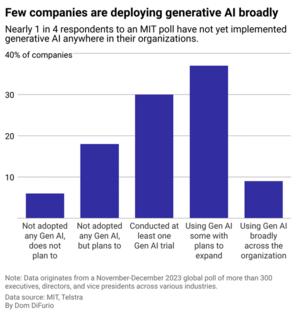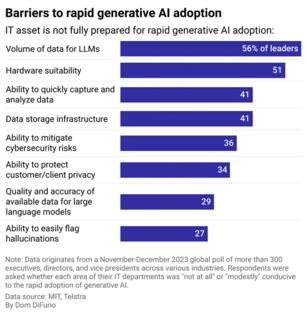Why the AI-ification of workplaces may move slower than we think
Published in Slideshow World
Subscribe
Why the AI-ification of workplaces may move slower than we think
For the last 1.5 years since ChatGPT launched, workers and business leaders have been singing two different tunes about the advent of generative artificial intelligence.
From the C-suites, there is excitement and optimism about cost savings and improved productivity—but among the rank and file are rumblings of anxiety and fear. An ADP Research Institute survey of 35,000 workers published in June found that more than 40% believe generative AI will replace some or most of the functions they perform at their companies.
Generative AI is a program that uses algorithms trained on large amounts of data to recognize patterns and predict the next sequence of words or sentences when prompted. Leading generative AI products from companies like OpenAI, Google, and Anthropic have proven effective at automating low-level tasks like copywriting, routine administrative work, and more complex data analysis.
However, even as C-suite leaders look forward to maintaining their competitive edge with the latest tech, surveys show that much of corporate America may be unprepared to adopt generative AI technology.
Drata analyzed a Massachusetts Institute of Technology global poll of more than 300 executives to illustrate companies' preparedness to adopt new AI technologies with the potential to substantially disrupt American jobs.
According to the International Monetary Fund's AI Preparedness Index, the U.S. ranks among the top countries prepared to implement AI across its economy. A nation's digital infrastructure, regulations, labor market, and other aspects of the economy are all factored into preparedness.
Three in 5 MIT poll respondents believe AI technology will "substantially disrupt" their industries over the next five years. They include leaders in financial services, manufacturing, telecommunications, oil and gas, and media and communications companies.
Some U.S. companies invest as if they don't want to be left behind. One study from Rackspace and Amazon Web Services, which itself has the leading market share selling AI services and access to the hardware powering AI applications, found that corporate investment is projected to double this year from 2023 to about $2.5 million.
Still, MIT's poll of hundreds of business leaders across industries suggests at least half of the corporate world is still in the trial-and-error phase of implementation, or has no interest in adopting generative AI at all.
Visit thestacker.com for similar lists and stories.
Generative AI is not yet commonplace
According to the poll, fewer than 10% of firms surveyed are using generative AI broadly across their organizations. Far more are conducting trials or using the technology in specific areas of the business with plans to expand.
The authors of the MIT report find that generative AI is currently most often used to make products in the tech and media industries and that adoption will ramp up next in customer service.
Even companies ahead of the curve and flush with capital to invest in AI are still learning from trials. Take McDonald's, for example, which recently pulled back on a pilot program for automating orders at its drive-through restaurants. The technology mistakenly entered orders for hundreds of nuggets and other incorrect menu items, frustrating customers.
Companies slow to emphasize digitization may take longer to adopt
The largest roadblock cited by companies that aren't confident in their ability to quickly implement AI broadly is a lack of data to train systems customized to their business needs. According to the report's authors, the need for massive amounts of data may be changing how companies think about data and how they collect it from their customers or clients. This hasn't just emerged as a barrier for those that aren't traditionally tech companies but also for the biggest names in AI currently developing leading generative AI models.
Another factor stymying deployment is the hardware necessary to store and support the computing required of generative AI models, as is the ability to protect against cybersecurity threats. Outside of IT barriers, the money needed to train and operate the systems is another major obstacle.
If generative AI is to carry with it the sea change most business leaders currently believe it will, more of those companies will first need to find investment dollars, data, and ethical frameworks for implementation before anxieties about its impact are proved right or wrong.
Story editing by Alizah Salario. Additional editing by Kelly Glass. Copy editing by Paris Close.
This story originally appeared on Drata and was produced and distributed in partnership with Stacker Studio.









Comments